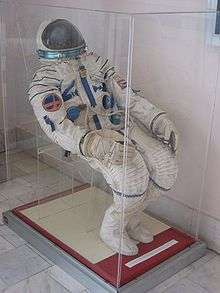Arnaldo Tamayo Méndez
| Arnaldo Tamayo Méndez | |
|---|---|
 | |
| Intercosmos Research Cosmonaut | |
| Nationality | Cuban |
| Status | Retired |
| Born |
29 January 1942 Guantanamo, Cuba |
Other occupation | Pilot |
| Rank | Brigadier General |
Time in space | 7d 20h 43m |
| Selection | 1978 Intercosmos Group |
| Missions | Soyuz 38 |
Mission insignia |
|
Arnaldo Tamayo Méndez (born January 29, 1942) was the first Latin American and the first person of African ancestry in space; he was proclaimed at the time as the first black cosmonaut.[1][2] As a member of the crew of Soyuz 38, he became the first Cuban citizen and the first person from a country in the Western Hemisphere other than the United States to travel into earth orbit.
Early life and military career
Born in Guantánamo,[3] Tamayo graduated from the Cuban Air Force Academy and became a pilot in the Cuban Air Force.
Intercosmos program

Tamayo was selected as part of the Soviet Union's seventh Intercosmos program on March 1, 1978. His backup in the Intercosmos program was fellow Cuban José López Falcón.
Tamayo, along with Soviet cosmonaut Yuri Romanenko, was launched into space aboard Soyuz 38 from Baikonur Cosmodrome on September 18, 1980, at 19:11 UTC. After docking with Salyut 6, Tamayo and Romanenko conducted experiments in an attempt to find what caused space adaptation syndrome (SAS), and perhaps even find a cure, and on the crystallisation of sucrose in microgravity, for the benefit of Cuba's sugar industry. The SAS experiment involved wearing special adjustable shoes for six hours every day that placed a load on the arch of the foot. After 124 orbits of the Earth (lasting 7 days, 20 hours and 43 minutes), Tamayo and Romanenko landed 180 km (110 mi) from Dzhezkazgan. The landing was risky, as it was during the night.[1][4][5][6]
Personal life
Following his time in the Intercosmos program, Tamayo was made Director of the Military Patriotic Educational Society known as Sociedad de Educación Patriótico-Militar "SEPMI". After his promotion to brigadier general, he became Director of International Affairs in the Cuban armed forces.
Since 1980, he has been a Deputy in the Cuban National Assembly, representing his home region of Guantánamo Province.[7]
He has been honored by the Cuban Government for being the first Cuban, the first Caribbean, and the first Latin American to go into orbit. He was awarded the titles of Hero of the Republic of Cuba and the Order of the Bay of Pigs.[7] He also is a recipient of the Hero of the Soviet Union award.
Tamayo is married and has two daughters and a son.
His space suit is preserved at the Museum of the Revolution in Havana.
See also
References
- 1 2 Burgess, Colin; Hall, Rex (2009). "The Intercosmos Programme". The First Soviet Cosmonaut Team. Springer. p. 339. ISBN 9780387848242.
- ↑ "Soviets Launch World's First Black Cosmonaut". Jet 59 (4): 8. 9 October 1980. ISSN 0021-5996.
- ↑ "Cosmonaut Biography: Arnaldo Tamayo Méndez". Spacefacts. Retrieved 2007-11-23.
- ↑ Harland, David M. (2007). "Routine Operations". The Story of Space Station Mir. Springer. pp. 92–93. ISBN 9780387739779.
- ↑ Furniss, Tim; Shayler, David J. (2007). "Soyuz 38". Praxis Manned Spaceflight Log 1961-2006. Springer. pp. 235–236. ISBN 9780387341750.
- ↑ "Tamayo-Mendez". Encyclopedia Astronautica. Archived from the original on 13 October 2007. Retrieved 2007-11-23.
- 1 2 "Guantánamo - Los candidatos del pueblo". Retrieved 2009-06-22.
External links
- "Pilots and aviators of the Cuban Aviation". Aviación Cubana. Retrieved 2007-11-23.
- "Ver el planeta desde la altura". BBC News (in Spanish). 2005-10-04. Retrieved 2008-09-21.